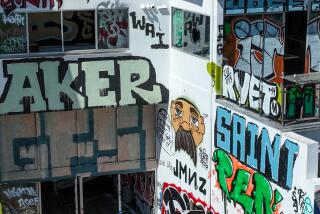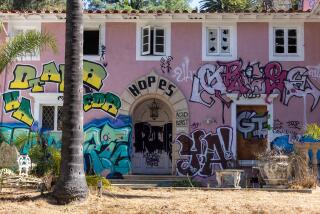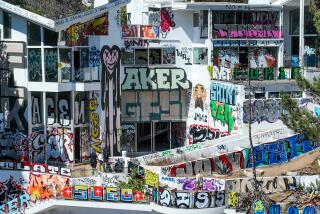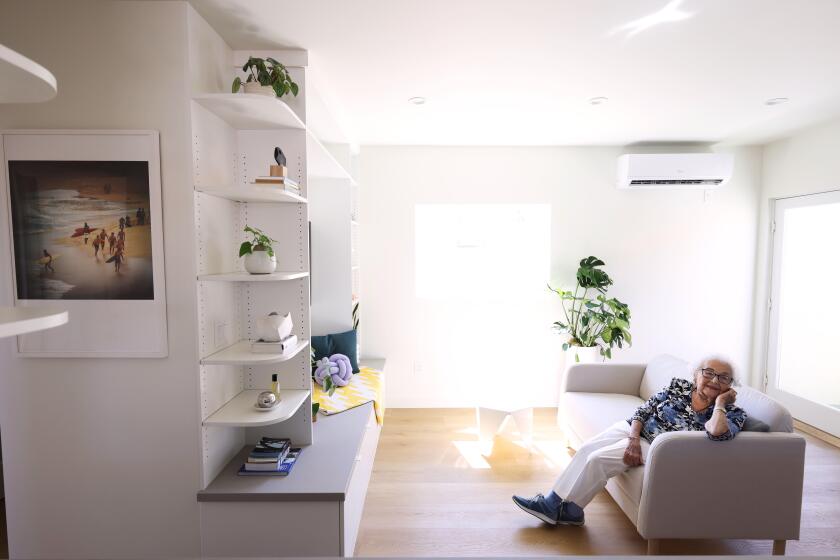‘Emoji house’ feud erupts as frustrated neighbors urge Manhattan Beach to take action
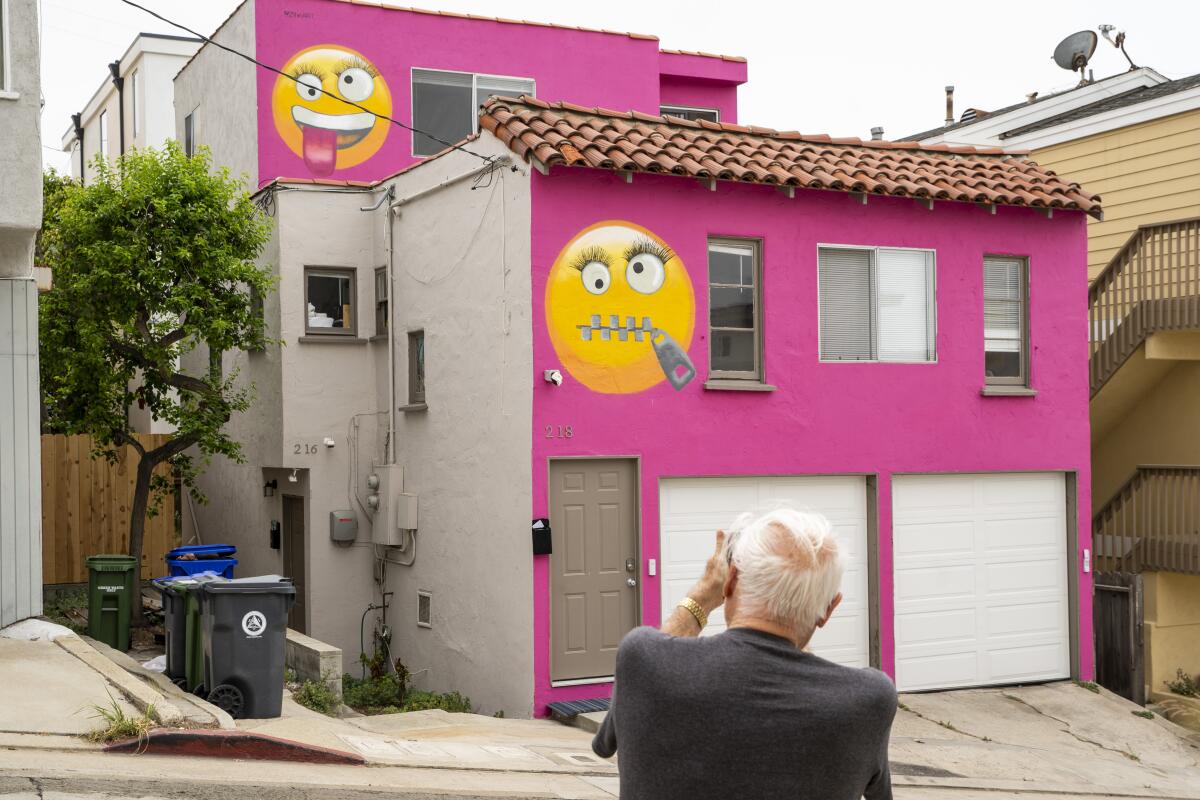
The houses on 39th street in Manhattan Beach were once painted a neutral palette of tans, whites and grays, complemented by the adventurous splash of light yellow or blue. But not now: One of the homes is sporting a bright paint job decorated with two giant emojis.
Neighbors say it’s retribution in a property dispute that has turned into a battle with the city.
Frustrated homeowners and renters from the El Porto neighborhood raised their concerns at a City Council meeting Tuesday night. The meeting marked the latest chapter in a saga that began in May when neighbors reported the home’s owner, Kathryn Kidd, to the city for using the property for short-term rentals, such as Airbnb, which is illegal in Manhattan Beach. After Kidd was fined for violating the city’s rental laws, the property was painted bubble-gum pink with yellow emojis, as first reported by Easy Reader News.
The mocking nature of the paint job, neighbors say, is in the emojis. An emoji on the duplex’s top floor shows one smiling face with its tongue sticking out and eyes looking in different directions crowned by long, bold eyelashes. Another on the lower level shares the same eyes and lashes but has a zipper across the mouth, representing the “shut up” emoji. Susan Wieland, a neighbor who reported Kidd, told Easy Reader News that she was wearing eyelash extensions when she once met Kidd.
The artist who spray-painted the design onto the home, known as Z the Art, posted a photo of the painted home to his Instagram account in May with the hashtags #TheEmojiHouse and #eyelashextensions. In a screenshot of that post obtained by The Times, there was a caption, which has since been deleted: “Are your neighbors constantly ratting you out? Have they cost you thousands in fines? Why risk a case when you can send them a pretty message?”
The paint job appeared shortly after Kidd was found in violation of the city’s rental laws and was fined $4,000. Kidd told Easy Reader News that the emojis were not intended to mock Wieland and that although people were entitled to their opinions, she was not in violation of any laws.
“I’m trying not to offend anybody,” Kidd said. “I did it for the purpose of being happy, being positive, and I think it’s cute and quirky and kind of funny, and certainly was a time for the emoji.”
Kidd doesn’t live in the home but resides elsewhere in Manhattan Beach. The home on 39th Street appears occupied, although no one came to the door when a Times reporter knocked on Monday.
Wieland said that although the situation might seem like a joke to Kidd, it’s not funny to residents who feel the city is doing nothing to protect them. She said neighbors had sent letters and numerous emails to city officials in the hope that some action would be taken over the paint job. Wieland said she and her husband had invited City Council members to their home to see the mural, but no one has taken them up on the offer.
“It’s almost like they’re afraid of her. And we really feel it is our city’s responsibility to have these regulations in place because people can do anything,” Wieland said. “That’s the most frightening thing. I feel like we’re not being protected against bullying.”
During Tuesday’s City Council meeting, a city attorney said the planning commission was researching what the council could do about murals and art on private buildings in residential neighborhoods. The attorney said the city could adopt content-neutral regulations as recommended by the planning commission, which the commission will look into.
A representative for the city did not respond to a request for comment.
Dina Doll, a homeowner who has lived in the tight-knit neighborhood for 18 years, said she was the first resident who notified the city about the emoji situation. She said she was told by a staff member that the paint job was an exercise of Kidd’s 1st Amendment rights and that the city could do nothing about it. Doll then contacted the City Council in early June and was told council members would consult the city attorney.
“And then there was a lot of nothing,” Doll said, adding that a group of neighbors then went to a city planning commission meeting in July seeking help.
In a video of the July 10 meeting, City Atty. Mike Estrada explained to commission members that the city had “very little, if any” jurisdiction over murals painted on private property with no public funding or public involvement.
“We plan on speaking about it [on Tuesday] because the sense I’ve gotten from speaking with council people since then is that they’re a little bit reluctant to take action,” Doll said ahead of the meeting. “I think the city is afraid of [Kidd] coming after them.”
Doll said one City Council member even recommended that the neighbors consider suing Kidd themselves, which made her feel that the city was relinquishing its duty to enforce its own codes and shifting that burden to residents.
“To me, there are just so many ways the city could step in if they want to,” Doll said. “At this point, there is no neutral for the city. Not taking action is condoning this. And do we really as a community want to condone this?”
The group of neighbors has explored the ways it could fight to get the paint job removed, including how it could be seen as graffiti under city code, how it could violate signage laws and how it fails to fit in with the character of the neighborhood. Doll also argues that it is a public safety issue and an obvious public nuisance because of the waves of news vans and curious onlookers who have visited the narrow road to catch a glimpse of the house.
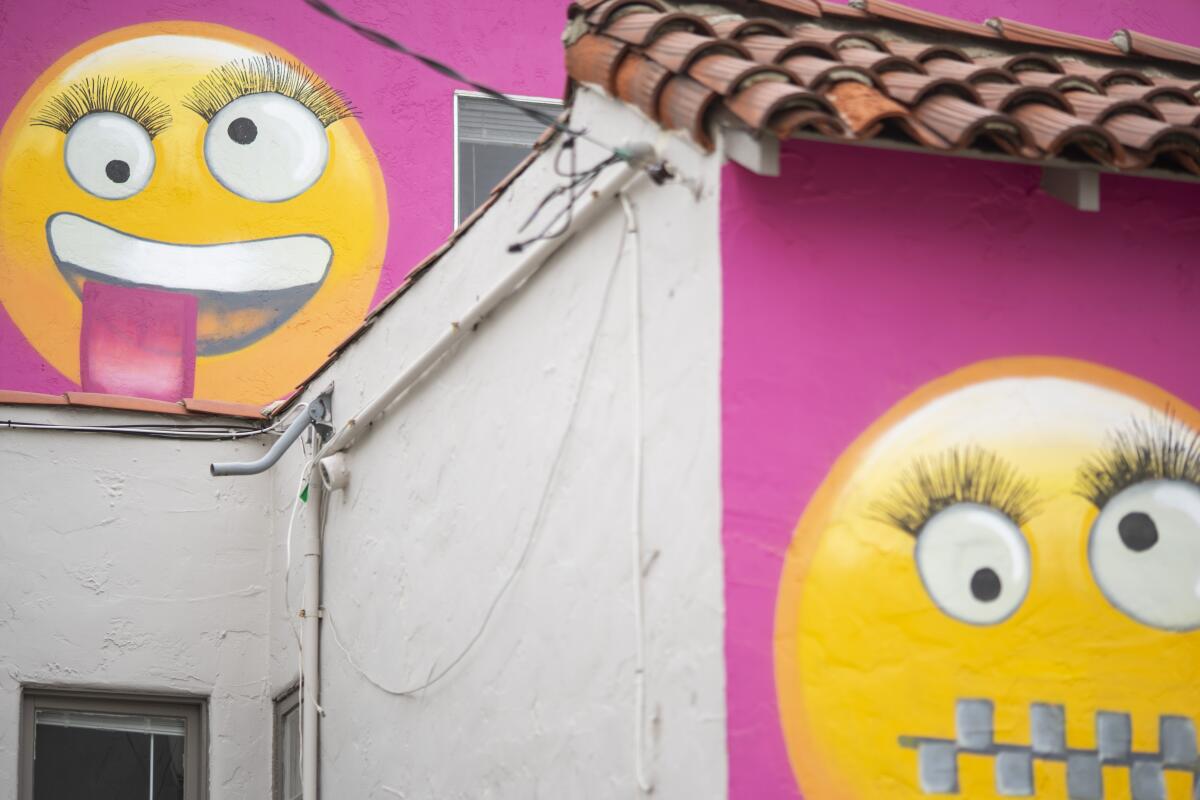
Chris Strickfaden, who also lives in the area, agreed that the emoji house had disrupted the neighborhood.
“Besides the obvious ugliness — and no one believes this is just artistic expression — it has now become a traffic nuisance issue with people stopping by to take selfies in front of the emoji house. It’s nuts,” he wrote in an email.
“I believe generally people should be able to do what they want with their property within the guidelines of the city, without governmental interference, including painting their exterior,” Strickfaden added. “However, this situation is not about the right of the homeowner. It’s about one homeowner saying F-U to the person she blames for her plight and F-U to the rest of the street.”
Carol Madonna, who has lived on the street since 1998 and attended Tuesday’s council meeting, said the situation could quickly become a slippery slope if the city continued to “cower behind freedom of speech.” If the city allows these emojis, she wondered if they would allow some of the more extreme ones, such as the poop emoji, and questioned where officials would draw the line.
“If we don’t do something, nothing is going to change and [Kidd] will have won her retaliation for us just following the rules,” Madonna said. “She was doing something illegal. We told the city about it, and now we’re paying for it.”
More to Read
Sign up for Essential California
The most important California stories and recommendations in your inbox every morning.
You may occasionally receive promotional content from the Los Angeles Times.
